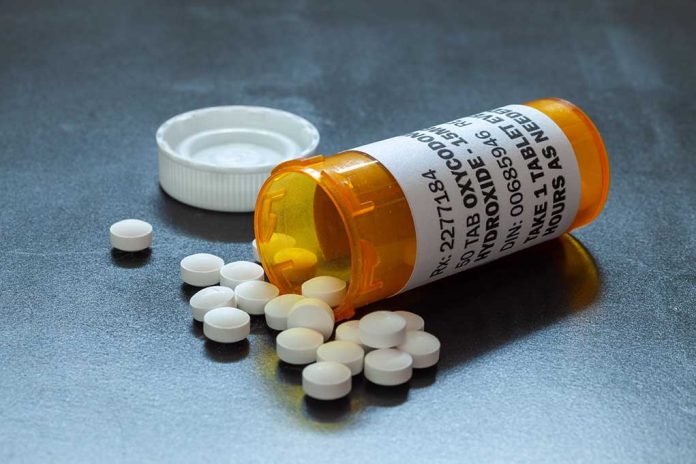
Purdue Pharma and the Sackler family will pay an unprecedented $7.4 billion to settle their role in America’s devastating opioid crisis, but critics say it’s not enough to compensate the millions of lives destroyed by their aggressive marketing of addictive painkillers.
Key Takeaways
- All 50 U.S. states, Washington D.C., and four territories unanimously agreed to a $7.4 billion settlement with Purdue Pharma and the Sackler family
- The settlement ends the Sackler family’s control of Purdue Pharma and prohibits them from selling opioids in the U.S. market
- Settlement funds will be distributed over 15 years, with most funds allocated within the first three years for treatment, prevention, and recovery programs
- The Sackler family will contribute approximately $6.5 billion to the settlement while maintaining they did nothing wrong
- Only about $850 million of the settlement is earmarked to directly compensate victims of the opioid crisis
Historic Settlement Ends Years of Legal Battles
After years of legal challenges that reached the Supreme Court, Purdue Pharma and the Sackler family have finally settled with all 50 states and U.S. territories. The $7.4 billion agreement marks the culmination of protracted negotiations following multiple rejected settlement attempts, including a $6 billion proposal overturned by the U.S. Supreme Court. The deal represents one of the largest corporate penalties in American history and puts an end to the Sackler family’s control over the pharmaceutical giant that many blame for fueling the opioid epidemic with its aggressive marketing of OxyContin and other highly addictive painkillers.
Under the terms of the settlement, the Sacklers will make an initial payment of $1.5 billion, with Purdue contributing approximately $900 million. The remaining funds will be distributed over the next 15 years, with the majority allocated in the first three years to immediately address opioid addiction treatment, prevention, and recovery programs. This settlement comes after Purdue Pharma filed for bankruptcy in 2019, and following several failed attempts to shield the Sackler family from future litigation, a strategy that was ultimately rejected by the courts.
From Pharmaceutical Giant to Public Trust
The settlement transforms Purdue Pharma from a profit-driven pharmaceutical manufacturer into a public benefit company focused on addressing the very crisis it helped create. A board of trustees will determine the company’s future operations, with strict monitoring to prevent any lobbying or marketing of opioid products. The agreement specifically prohibits the Sackler family from participating in the U.S. opioid market going forward, effectively ending their decades-long influence in the industry that made them billions while communities across America suffered the devastating consequences of addiction.
“While we know that no amount of money can erase the pain for those who lost loved ones to this crisis, this settlement will help prevent future tragedies through education, prevention, and other resources,” said New Jersey Attorney General Matthew Platkin.
Importantly, the settlement maintains individuals’ rights to pursue civil litigation against the Sacklers, a significant change from previous settlement attempts that sought to shield family members from personal liability. However, with most of the $7.4 billion directed toward state and local governments for addiction treatment programs, critics have pointed out that only about $850 million is designated for direct compensation to victims and their families—an amount many consider woefully inadequate given the scale of suffering caused by the opioid crisis.
Accountability Without Admission of Wrongdoing
Despite agreeing to pay billions, the Sackler family has steadfastly maintained they did nothing wrong in their marketing and distribution of OxyContin. This lack of accountability has angered many victims’ advocates who point to internal company documents showing Purdue executives knew about the addictive properties of their products while aggressively marketing them as safe for long-term use. The settlement represents a financial penalty without the moral reckoning many have demanded, especially as the opioid crisis continues to claim American lives despite recent decreases in overdose deaths to pre-pandemic levels.
“As Pennsylvania families and communities suffered during an unprecedented addiction crisis, Purdue and the Sacklers reaped the mammoth profits from their products. This monumental settlement achieves the top priority of getting as much money as quickly as possible to prevention, treatment, and recovery programs across the Commonwealth. My office will continue engagement with municipal leaders to ensure millions of dollars reach every corner of the state,” said Pennsylvania Attorney General Dave Sunday.
When combined with settlements from other pharmaceutical companies, distributors, and pharmacy chains, the total industry payout for the opioid crisis now exceeds $50 billion. While these funds will provide critical resources for addiction treatment and prevention, they represent only a fraction of the estimated societal costs of the epidemic, which some studies place at nearly $700,000 per case of opioid use disorder. The settlement now awaits final approval from the bankruptcy court before funds can begin flowing to states and affected communities.



